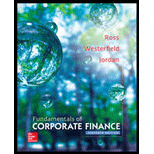
Fundamentals of Corporate Finance
11th Edition
ISBN: 9780077861704
Author: Stephen A. Ross Franco Modigliani Professor of Financial Economics Professor, Randolph W Westerfield Robert R. Dockson Deans Chair in Bus. Admin., Bradford D Jordan Professor
Publisher: McGraw-Hill Education
expand_more
expand_more
format_list_bulleted
Question
Chapter 6, Problem 17QP
Summary Introduction
To calculate: The
Introduction:
The future value of cash is the accumulated value including interest after a specified period. It is utilized to take effective decision at present or to assess the investment potentiality.
Expert Solution & Answer
Want to see the full answer?
Check out a sample textbook solution
Students have asked these similar questions
Finance problem qn
Data is not clear then comment please
If image is not clear then comment.
Chapter 6 Solutions
Fundamentals of Corporate Finance
Ch. 6.1 - Prob. 6.1ACQCh. 6.1 - Prob. 6.1BCQCh. 6.1 - Unless we are explicitly told otherwise, what do...Ch. 6.2 - In general, what is the present value of an...Ch. 6.2 - In general, what is the present value of a...Ch. 6.3 - If an interest rate is given as 12 percent...Ch. 6.3 - What is an APR? What is an EAR? Are they the same...Ch. 6.3 - Prob. 6.3CCQCh. 6.3 - What does continuous compounding mean?Ch. 6.4 - What is a pure discount loan? An interest-only...
Ch. 6.4 - What does it mean to amortize a loan?Ch. 6.4 - Prob. 6.4CCQCh. 6 - Two years ago, you opened an investment account...Ch. 6 - A stream of equal payments that occur at the...Ch. 6 - Your credit card charges interest of 1.2 percent...Ch. 6 - What type of loan is repaid in a single lump sum?Ch. 6 - Annuity Factors [LO1] There are four pieces to an...Ch. 6 - Prob. 2CRCTCh. 6 - Prob. 3CRCTCh. 6 - Present Value [LO1] What do you think about the...Ch. 6 - Prob. 5CRCTCh. 6 - Prob. 6CRCTCh. 6 - APR and EAR [LO4] Should lending laws be changed...Ch. 6 - Prob. 8CRCTCh. 6 - Prob. 9CRCTCh. 6 - Prob. 10CRCTCh. 6 - Prob. 11CRCTCh. 6 - Prob. 12CRCTCh. 6 - Prob. 1QPCh. 6 - Prob. 2QPCh. 6 - Prob. 3QPCh. 6 - Prob. 4QPCh. 6 - Calculating Annuity Cash Flows [LO1] If you put up...Ch. 6 - Calculating Annuity Values [LO1] Your company will...Ch. 6 - Calculating Annuity Values [LO1] If you deposit...Ch. 6 - Calculating Annuity Values [LO1] You want to have...Ch. 6 - Prob. 9QPCh. 6 - Calculating Perpetuity Values [LO1] The Maybe Pay...Ch. 6 - Prob. 11QPCh. 6 - Prob. 12QPCh. 6 - Calculating APR [LO4] Find the APR, or stated...Ch. 6 - Calculating EAR [LO4] First National Bank charges...Ch. 6 - Prob. 15QPCh. 6 - Prob. 16QPCh. 6 - Prob. 17QPCh. 6 - Calculating Present Values [LO1] An investment...Ch. 6 - EAR versus APR [LO4] Big Doms Pawn Shop charges an...Ch. 6 - Prob. 20QPCh. 6 - Calculating Number of Periods [LO3] One of your...Ch. 6 - Calculating EAR [LO4] Friendlys Quick Loans, Inc.,...Ch. 6 - Prob. 23QPCh. 6 - Calculating Annuity Future Values [LO1] You are...Ch. 6 - Calculating Annuity Future Values [LO1] In the...Ch. 6 - Prob. 26QPCh. 6 - Prob. 27QPCh. 6 - Prob. 28QPCh. 6 - Simple Interest versus Compound Interest [LO4]...Ch. 6 - Prob. 30QPCh. 6 - Prob. 31QPCh. 6 - Prob. 32QPCh. 6 - Calculating Future Values [LO1] You have an...Ch. 6 - Calculating Annuity Payments [LO1] You want to be...Ch. 6 - Prob. 35QPCh. 6 - Prob. 36QPCh. 6 - Prob. 37QPCh. 6 - Growing Annuity [LO1] Your job pays you only once...Ch. 6 - Prob. 39QPCh. 6 - Calculating the Number of Payments [LO2] Youre...Ch. 6 - Prob. 41QPCh. 6 - Prob. 42QPCh. 6 - Prob. 43QPCh. 6 - Prob. 44QPCh. 6 - Prob. 45QPCh. 6 - Prob. 46QPCh. 6 - Prob. 47QPCh. 6 - Prob. 48QPCh. 6 - Prob. 49QPCh. 6 - Calculating Present Value of a Perpetuity [LO1]...Ch. 6 - Prob. 51QPCh. 6 - Prob. 52QPCh. 6 - Calculating Annuities Due [LO1] Suppose you are...Ch. 6 - Prob. 54QPCh. 6 - Prob. 55QPCh. 6 - Prob. 56QPCh. 6 - Prob. 57QPCh. 6 - Prob. 58QPCh. 6 - Prob. 59QPCh. 6 - Prob. 60QPCh. 6 - Calculating Annuity Values [LO1] You are serving...Ch. 6 - Prob. 62QPCh. 6 - Calculating EAR with Points [LO4] The interest...Ch. 6 - Prob. 64QPCh. 6 - Prob. 65QPCh. 6 - Prob. 66QPCh. 6 - Prob. 67QPCh. 6 - Calculating Annuity Payments [LO1] This is a...Ch. 6 - Prob. 69QPCh. 6 - Prob. 70QPCh. 6 - Prob. 71QPCh. 6 - Calculating Interest Rates [LO4] A financial...Ch. 6 - Prob. 73QPCh. 6 - Prob. 74QPCh. 6 - Ordinary Annuities and Annuities Due [LO1] As...Ch. 6 - Calculating Growing Annuities [LO1] You have 40...Ch. 6 - Prob. 77QPCh. 6 - Prob. 78QPCh. 6 - Prob. 79QPCh. 6 - Prob. 80QPCh. 6 - Prob. 1MCh. 6 - Prob. 2MCh. 6 - Prob. 3MCh. 6 - Prob. 4MCh. 6 - Prob. 5MCh. 6 - Prob. 6M
Knowledge Booster
Similar questions
- Answer this qnarrow_forwardWhat is the annotaion? Please help give some examples.arrow_forwardItem 2 Sequoia Furniture Company’s sales over the past three months, half of which are for cash, were as follows: March April May $ 426,000 $ 676,000 $ 546,000 Assume that Sequoia’s collection period is 60 days. What would be its cash receipts in May? What would be its accounts receivable balance at the end of May? Now assume that Sequoia’s collection period is 45 days. What would be its cash receipts in May? What would be its accounts receivable balance at the end of May?arrow_forward
- Andres Michael bought a new boat. He took out a loan for $23,600 at 3.25% interest for 3 years. He made a $4,120 partial payment at 3 months and another partial payment of $3,440 at 6 months. How much is due at maturity?arrow_forwardOn May 3, 2020, Leven Corporation negotiated a short-term loan of $840,000. The loan is due October 1, 2020, and carries a 6.60% interest rate. Use ordinary interest to calculate the interest. What is the total amount Leven would pay on the maturity date? (Use Days in a year table.)arrow_forwardNolan Walker decided to buy a used snowmobile since his credit union was offering such low interest rates. He borrowed $4,300 at 3.75% on December 26, 2021, and paid it off February 21, 2023. How much did he pay in interest? (Assume ordinary interest and no leap year.) (Use Days in a year table.)arrow_forward
arrow_back_ios
SEE MORE QUESTIONS
arrow_forward_ios
Recommended textbooks for you
 Pfin (with Mindtap, 1 Term Printed Access Card) (...FinanceISBN:9780357033609Author:Randall Billingsley, Lawrence J. Gitman, Michael D. JoehnkPublisher:Cengage Learning
Pfin (with Mindtap, 1 Term Printed Access Card) (...FinanceISBN:9780357033609Author:Randall Billingsley, Lawrence J. Gitman, Michael D. JoehnkPublisher:Cengage Learning
- Principles of Accounting Volume 2AccountingISBN:9781947172609Author:OpenStaxPublisher:OpenStax College
 PFIN (with PFIN Online, 1 term (6 months) Printed...FinanceISBN:9781337117005Author:Randall Billingsley, Lawrence J. Gitman, Michael D. JoehnkPublisher:Cengage Learning
PFIN (with PFIN Online, 1 term (6 months) Printed...FinanceISBN:9781337117005Author:Randall Billingsley, Lawrence J. Gitman, Michael D. JoehnkPublisher:Cengage Learning

Pfin (with Mindtap, 1 Term Printed Access Card) (...
Finance
ISBN:9780357033609
Author:Randall Billingsley, Lawrence J. Gitman, Michael D. Joehnk
Publisher:Cengage Learning



Principles of Accounting Volume 2
Accounting
ISBN:9781947172609
Author:OpenStax
Publisher:OpenStax College

PFIN (with PFIN Online, 1 term (6 months) Printed...
Finance
ISBN:9781337117005
Author:Randall Billingsley, Lawrence J. Gitman, Michael D. Joehnk
Publisher:Cengage Learning
